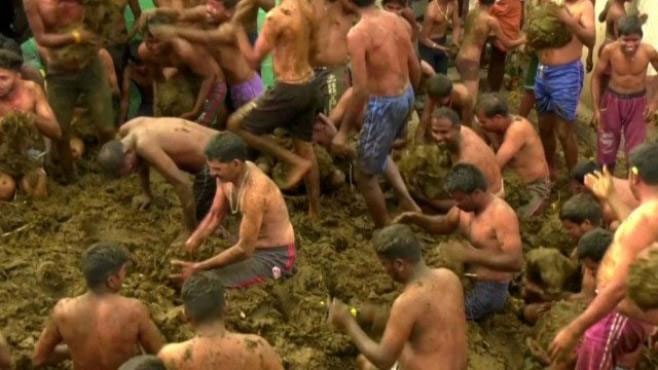The small village of Gummatapura in India is famous worldwide for its unique way of concluding the annual Diwali celebrations with a lively cow dung battle known as “Gorehabba.”
Spain has La Tomatina, the famous tomato fight; Italy has the traditional Ivrea Orange Battle; and India has Gorehabba, a cow dung battle to mark the end of the important Diwali festival.
At first hearing, many might think this sounds like an insult to the festival, but understanding the importance and significance of cow dung in Indian culture reveals a different meaning.

Cow dung holds special significance in India.
Cow dung in a country with a population of over 1.3 billion people is considered to have special meaning, even valued to the extent that companies use it as an ingredient in beauty products, handicrafts, and even radiation-repelling devices. Thus, throwing cow dung at each other is not seen as unpleasant by the hundreds who participate in Gorehabba.
The day of the cow dung battle begins with gathering “ammunition” from the homes of villagers who own cows in Gummatapura, located on the border between Karnataka and Tamil Nadu. The dung is loaded onto beautifully decorated tractors adorned with marigolds and transported to a local temple, where priests perform a blessing ceremony.
Next, the “lucky cow dung” is brought to an open area in Gummatapura, where “daredevils” are ready to charge in bare-chested to prepare for the launch of their projectiles. This is a fierce battle, with dung flying everywhere.
For the young men participating in Gorehabba, overcoming barriers and being “hit” by cow dung is both a source of joy and a belief in the benefits of the “ammunition.”

Cow dung collected in an open area before the Gorehabba festival in Gummatapura village, south of Bangalore. (Photo: AFP).
Many festival participants believe that simply touching blessed cow dung can cure any illness and significantly increase the chances of never falling sick.
People from all over India flock to Gummatapura each year to partake in the cow dung throwing festival, believing it to be an enjoyable activity that can also bring health benefits.
“If we have an illness, we will be cured,” shared Mahesh, a local participant in the cow dung throwing festival.
Locals believe that the origin of the cow dung battle comes from one of the deities born from cow dung, named Beereshwara Swamy.
This is not the only famous cow dung battle in India. The people of Kairuppala, a village in Andhra Pradesh, also engage in a grand cow dung cake battle each year.
Many Hindus believe that cows and everything associated with them are sacred and have purifying effects on homes. Indian Prime Minister Narendra Modi, who is also Hindu, has promoted the protection of this animal. Many states in India have long banned the slaughter of cows for meat.
Some have even recommended cow urine as a remedy for preventing and treating COVID-19 and various other diseases. India is also looking to promote the production of toothpaste, shampoo, and mosquito repellents made from cow waste.


















































